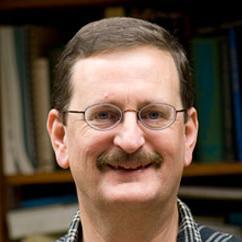Peter Siver
Charles and Sarah P. Becker '27 Professor of Botany and Environmental Studies
Joined Connecticut College: 1990
Education
M.S., University of New Hampshire
Ph.D., University of Connecticut, Storrs
Phycology
Impacts of environmental stress on lakes
Reconstructing ancient environments
A noted expert in limnology, the study of lakes, Peter Siver teaches classes in introductory biology, introductory botany, environmental studies, phycology, limnology and geographic information systems. Siver's research helps to disprove the hypothesis that acid rain always causes lakes to become more acidic. Focusing mainly on Connecticut lakes, Siver demonstrates that Southern New England lakes have not become more acidic as a result of acid deposition.
Visit http://silicasecchidisk.conncoll.edu/, his freshwater ecology research site.
To make his vast collection more accessible to other scientists, the National Science Foundation (NSF) awarded Siver nearly $150,000 in 2011 to assemble, catalog and archive the chrysophyte and diatom samples and corresponding data.
He shows that surrounding watersheds help regulate the effect of acid rain on lakes and ponds, in some cases reducing acidity over time. Through major grants, the National Science Foundation has continued to support Siver's research which focuses on examining the types of algae living in lakes. Together with his undergraduates, Siver has discovered about 10 new species of these organisms, which when present yield information about the historical lake chemistry. A 2004 NSF grant was to study algae in freshwater lakes and ponds on East Coast. The previous year's grant was to develop a Web-based guide to microscopic diversity.
Siver's specific research interests include studying the ability of extant and fossil algal floras, especially chrysophytes and diatoms, to reveal the effects of environmental stresses on aquatic ecosystems; the use of algal assemblages in reconstructing paleoenvironments; biotic surveys of chrysophyte floras in New England, the Adirondacks, the Poconos, Florida and Argentina; integration of the Geographic Information System (GIS) in lake management issues; and the chemistry of Connecticut lakes.
Siver has written two books about his research, "The Biology of Mallomonas: Taxonomy and Ecology," and "Connecticut Lakes: A Study of the Chemical and Physical Properties of Fifty-six Connecticut Lakes." Siver's findings have also been published in journals such as, Nova Hedwigia, Florida Scientist, Journal of Paleolimnology, Canadian Journal of Botany, Journal of Environmental Quality, and the Nordic Journal of Botany.
View the Environmental Studies program website, the botany department website, and the Goodwin-Niering Center for the Environment website.
"It's not that I'm saying acid rain isn't a problem, because it clearly is. What I'm saying is, some of our old ideas are going right out the window. But why? That's the interesting thing. That's what we have to figure out." - Peter Siver
Contact Peter Siver
Mailing Address
Peter Siver
Connecticut College
Box # BOTANY & ENVIRONMENTAL STUDIES/New London Hall
270 Mohegan Ave.
New London, CT 06320
Office
307 New London Hall
